

A Media Specialist's Guide to the Internet. New law strengthens freedom of speech for high school journalists Schools ilnews. Responsibility Rather Than Excuses (Ages K-12) Through group discussions, students will learn the difference between making excuses and being responsible.
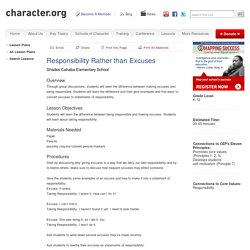
Digital Citizenship Spotlight. Introducing Academic Integrity (Grades 6-8) Introducing Academic Integrity Berlin Community School Overview.
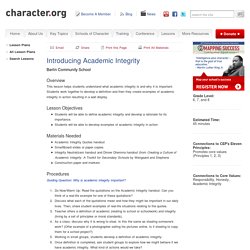
Core Values and What They Mean to Me (Grade K) Gateway Site for Media Literacy Education. Library Learning Games - media center. Elementary Librarian - Library lesson plans and ideas for the elementary librarian. Lessons incorporate Common Core and AASL standards. Home. Copyright chart. Plagiarism and Academic Honesty. Episode 1 - Academic Integrity. Teacher's Guide to Digital Citizenship. The horror stories of young people not grasping the reach and influence of the content they put online are familiar to all of us.
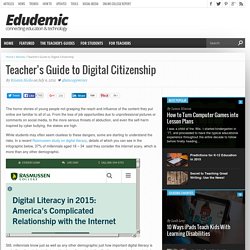
From the loss of job opportunities due to unprofessional pictures or comments on social media, to the more serious threats of abduction, and even the self-harm inspired by cyber bullying, the stakes are high. While students may often seem clueless to these dangers, some are starting to understand the risks. In a recent Rasmussen study on digital literacy, details of which you can see in the infographic below, 37% of millennials aged 18 – 34 said they consider the internet scary, which is more than any other demographic. Still, millennials know just as well as any other demographic just how important digital literacy is and will continue to be to their working lives.
As such, studies like these serve to demonstrate how crucial teaching digital literacy — particularly at a young age when that digital footprint is still lightly drawn — has become. Copyright, Exceptions, and Fair Use: Crash Course Intellectual Property #3. Can I Use that Picture? The Terms, Laws, and Ethics for Using Copyrighted Images – The Visual Communication Guy: Design, Writing, and Teaching Resources All in One Place! Need to use an image but not sure if you have the legal and ethical right to do so?
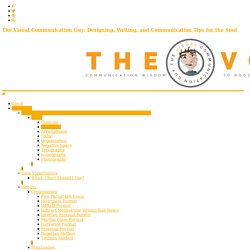
Understanding the laws for using images can be a bit tricky, especially because there is wiggle room within the laws. And, with the mass distribution of images on the internet, it’s no wonder we’re all asking the the same question over and over again: can I use that picture? Whether for your business presentation, your school project, or your organization’s brochure, you’ve likely placed in images to make your designs more visually appealing. How to Blog Legally. One of the many wonderful things about blogging is that you don’t need any previous experience or education to do it.

You just dive in and go. Unfortunately, it’s also the cause of a lot of problems. Like the fact many bloggers don’t know how to blog legally. 9 Fundamental Digital Skills for 21st Century Teachers. December 30, 2016 As we have pointed elsewhere, ' in a digitally focused world, education is getting more and more digitized pushing us, teachers and educators, to re-conceptualize what it really means to be a teacher in the 21st century.

Whether you are a technological determinist or a digital instrumentalist, technology has become an essential force shaping much of our teaching and pedagogy. It has also placed a number of demands and exigencies on us and to meet these exigencies we need to develop a set of key digital skills '. The visual below, based on a chart we shared in the past, features what we believe are some of the fundamental digital skills every 21st century teacher should possess. We invite you to check it out and share with us your feedback in our Facebook page. Feel free to download, print, or share the visual the way you want provided you credit our blog as the source. You can download the visual below from this link. Episodes and Quizzes - Academic Integrity. A dozen ways to teach ethical and safe technology use. A+ Research & Writing. Tools for Teaching Cyber Ethics. Everyone knows someone who has commited a cyber crime.
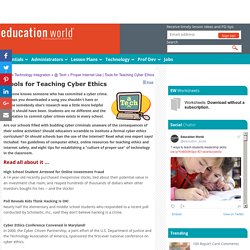
Perhaps you downloaded a song you shouldn't have or maybe somebody else's research was a little more helpful than it should have been. Students are no different and the temptation to commit cyber crimes exists in every school. Are our schools filled with budding cyber criminals unaware of the consequences of their online activities? Should educators scramble to institute a formal cyber ethics curriculum? Or should schools ban the use of the Internet? High School Student Arrested for Online Investment Fraud A 14-year-old recently purchased inexpensive stocks, lied about their potential value in an investment chat room, and reaped hundreds of thousands of dollars when other investors bought his lies -- and the stocks! Awesome Graphic on 21st Century Pedagogy. While I was revisiting the topic of the 21st century pedagogy which I have covered in several posts here in Educational Technology and Mobile Learning, I come across this awesome graph created by our colleague Andrew Churches.
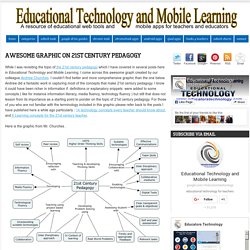
I couldn't find better and more comprehensive graphic than the one below. Andrew did a fantastic work in capturing most of the concepts that make 21st century pedagogy. I know it could have been richer in information if definitions or explanatory snippets were added to some concepts ( like for instance information literacy, media fluency, technology fluency ) but still that does not lesson from its importance as a starting point to ponder on the topic of 21st century pedagogy. For those of you who are not familiar with the terminology included in this graphic please refer back to the posts I have published here a while ago particularly : 14 technology concepts every teacher should know about, and 6 Learning concepts for the 21st century teacher.
8 digital skills we must teach our children. The social and economic impact of technology is widespread and accelerating.
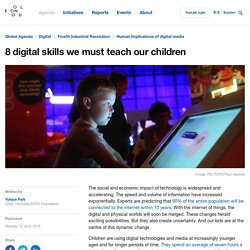
The speed and volume of information have increased exponentially. Experts are predicting that 90% of the entire population will be connected to the internet within 10 years.